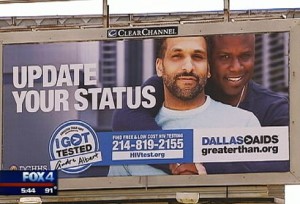 The image attached to this blog post displays a billboard currently on display in Dallas is meant to raise awareness of HIV and encourage people to get tested. To anyone who cares about their fellow human being’s good health, this is a good message to get out. Regular testing for HIV and other STD’s allows for early detection and treatment of infections. And while HIV and certain other STD’s cannot be cured (at least not at this time), early and proper treatment can mean for a longer life and a better quality of life for the person infected. Also, it means that such a person can take precautions to protect hir own partners.
The image attached to this blog post displays a billboard currently on display in Dallas is meant to raise awareness of HIV and encourage people to get tested. To anyone who cares about their fellow human being’s good health, this is a good message to get out. Regular testing for HIV and other STD’s allows for early detection and treatment of infections. And while HIV and certain other STD’s cannot be cured (at least not at this time), early and proper treatment can mean for a longer life and a better quality of life for the person infected. Also, it means that such a person can take precautions to protect hir own partners.
Writing for LGBTQNation, Brody Levesque notes that the billboard’s choice to depict a black male couple was based on demographics concerning who is most affected in the area by HIV:
A report released in 2011 by the Dallas County Health and Human Services Department revealed that the new infections rate among the city’s black community had increased to nearly half of all newly reported infections.
The report also noted that county’s rate of HIV infection was the highest in the state of Texas and that the rate was disproportionately higher among African-American men who have sex with men.
There’s a certain logic in choosing advertising that most closely represents a group you’re particularly interested in reaching out to when it comes to health concerns. So it makes sense that Dallas Health and Community Services would choose this image.
Of course, not everyone sees it that way, including Dallas city council member Vonciel Jones Hill. Hill has decried the billboard as something in which “African American men who engage in homosexual conduct [are] presented as acceptable.”
Funny, it seems to me that the message of the billboard seems more along the lines that African American men who love and have sex with other men should get tested, just like every other sexually active person. How Hill comes to the conclusion that the billboard is making any moral judgement in either direction is a bit of mystery.
Or it would be a mystery if I haven’t seen this song and dance a thousand times before. To people like Hill, acknowledging that LGBT people and same-sex couples exist at all — at least not without a sufficient amount of self-righteous condemnation strewn in with the acknowledgement — is an automatic endorsement. Hill has aligned herself with the other reality-deniers who wish to pretend that LGBT people don’t exist and don’t form relationships, and instead imagine whatever horrible straw-queers their own — dare I say depraved? — imaginations can come up with.
That such people are willing to prioritize their desire to promote ugly stereotypes of LGBT people and decry anything that undermines those stereotypes over concern for the actual health and well-being of LGBT people speaks volumes.
